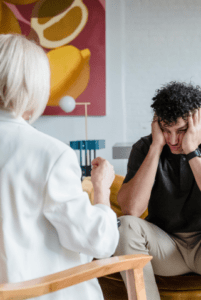Therapy for Depression Englewood, Co
At times, it may feel as though sadness is here to stay, making it difficult to see through the cloud of gloomy thoughts. This frequently results in a profound feeling of sadness as depression gradually takes over more and more of your daily life.
I prioritize safety and support. You are able to express yourself openly and without judgment. You will overcome obstacles and embrace your inner strength. You will learn coping mechanisms.
Our Depression Therapy Approach
Dr Susan Hollander is dedicated to providing personalized care for individuals struggling with depression. The approach has evidence-based techniques. I address each person’s unique mental health concerns and symptoms. Our goal goes beyond temporary fixes. I aim to help you make lasting improvements to your well-being.

Customized Support and Empathy:
No two individuals experience depression in the same way. By learning about your past, difficulties, and the role of depression in your daily life, you gain valuable insights. These insights let us craft a treatment plan that fits your needs and goals.
Encouraging Mindfulness and Emotional Strength:
At the core of the caring and holistic strategy lies the goal of strengthening your mindfulness and emotional resilience. I am committed to helping you understand your thoughts and emotions. This will help you to manage depression symptoms. Learning mindfulness techniques will help you keep emotional balance.
[cta_card]
Cultivating Strong Coping Mechanisms:
I am dedicated to helping you build resilience and coping skills. You need these to overcome obstacles and thrive in many parts of your life. I aim to empower you. You’ll do this by addressing unhelpful thoughts, managing stress and anxiety, and adding positive habits to your routine. The techniques are practical and accessible.
Meet Our Depression Therapy Specialists
Located in the neighborhood of Englewood, Colorado, the depression therapy offers a warm and welcoming environment dedicated to aiding in your recovery and personal growth. I approach each session with care and empathy. I tailor your care to fit your needs. I guide you through the challenges of managing depression and encouraging emotional well-being.
Depression Can Make You Feel Isolated, But You’re Not Alone
Depression often creates a feeling of loneliness, as if you’re cut off from the world.
Being alone isn’t just about physical distance from others. It’s also about feeling disconnected from people, even when they’re nearby. At the Englewood office, the therapy sessions aim to help you reconnect with your environment and the people close to you.
Through techniques, I strive to help you communicate your emotions and thoughts in a safe and genuine manner. The goal is to help you find supportive relationships. This will turn loneliness into chances for connection and understanding.
Depression Can Drain Your Energy, But You Can Get it Back
When you’re dealing with depression, it can feel like all your energy has been taken away.
It’s common to feel like easy tasks are suddenly difficult, and activities that once brought joy no longer do. Therapy is designed to provide support for these challenges.
We will explore ways to bring back your energy and excitement for life. I will use simple and manageable approaches to bring new life into your daily tasks and interests. I am here to help you feel joy and inspiration again, step by step. Your passion for living will be rekindled.
Clearing the Fog of Depression for a Brighter Outlook
Depression often clouds your outlook on life, making everything seem bleak or hopeless.
The hazy outlook might hide growth opportunities. It could also block the path to picturing a richer future. Through our collaborative sessions, I seek to bring greater clarity to your ideas.
I am here to help you fight negative thinking. I will give you tools to see things in a more positive way. I will also encourage you to see and appreciate the good parts of your life. The aim is to assist you in approaching the world and your future with a renewed sense of hope and understanding.
Learn more about Dr Susan L Hollander, PH.D.
Therapy for Depression FAQs
What is depression therapy?
Depression therapy in Englewood, Colorado involves a therapeutic process designed to treat depression by addressing underlying issues and managing symptoms. It provides counseling and support. It helps you develop coping skills and healthier emotions.
Read more about what to expect.
How long does depression therapy usually last?
How long therapy for depression lasts depends on the person’s symptoms and life. Some may find relief within a few months, while others may engage in ongoing therapy for longer periods.
Can depression be treated without medication?
Yes, many mental health concerns, including depression, are treated effectively without medication. Talk therapy, lifestyle changes, and coping strategies manage symptoms and boost well-being.
What are common signs that I might need depression therapy?
Signs might point to the need for depression therapy. They include lasting sadness, loss of interest, hopelessness, changes in appetite or sleep, and trouble concentrating. If these symptoms disrupt daily life, seeking professional help is advisable.
Is depression therapy confidential?
Yes, depression therapy provides a safe space. All sessions are confidential, protecting your privacy. They also provide a trusting relationship between you and your therapist.
How do I know if I have depression or just temporary sadness?
If feelings of sadness persist most of the day, nearly every day for two weeks, and interfere with your daily functioning, it might be depression. Temporary sadness tends to be short-lived and less disruptive. A therapist will help determine the nature of your feelings.
What therapy methods are used to treat depression?
Therapists may use many methods. These include cognitive-behavioral therapy, mindfulness, and EMDR therapy. These approaches help clients explore and understand their emotions, beliefs, and behaviors to promote healing and growth.
Can lifestyle changes help with depression?
Yes, lifestyle changes such as regular exercise, a healthy diet, proper sleep, and social interaction significantly help alleviate depression symptoms and support overall mental health. https://susanlhollanderphd.com/ to begin making positive changes to your life.
What’s the difference between a therapist and a psychiatrist for depression?
A therapist provides counseling and uses non-medical means to help clients manage depression. A psychiatrist is a doctor. They are able to prescribe medication and provide therapy for tough mental health issues like depression.
How often should I attend depression therapy sessions?
Frequency varies, but many therapists recommend starting with weekly sessions. As clients progress, they may meet less frequently depending on their needs and improvement.
Can depression come back after therapy?
Depression might recur, but therapy helps to equip clients with strategies to manage symptoms and prevent relapse. Ongoing maintenance sessions may be beneficial for some individuals.
Is online depression therapy effective?
Yes, online therapy has been shown to be effective for many individuals. It is flexible and accessible. This makes it easier for clients to get consistent support.
How do I choose the right therapist for my depression?
Look for a therapist trained in treating depression and who has expertise that matches your needs. It’s important to feel comfortable and connected with your therapist. So, consider an initial consultation to check if you are compatible.
What if I don’t feel comfortable with my therapist?
It’s essential to have a good rapport with your therapist. If you feel uncomfortable, it’s perfectly okay to seek another therapist whose approach and demeanor better match your needs.
Can therapy make my depression worse?
Initially, discussing deep emotional issues might feel overwhelming and intensify symptoms temporarily. However, this is often part of healing. A trained therapist will guide you through these challenges safely.



